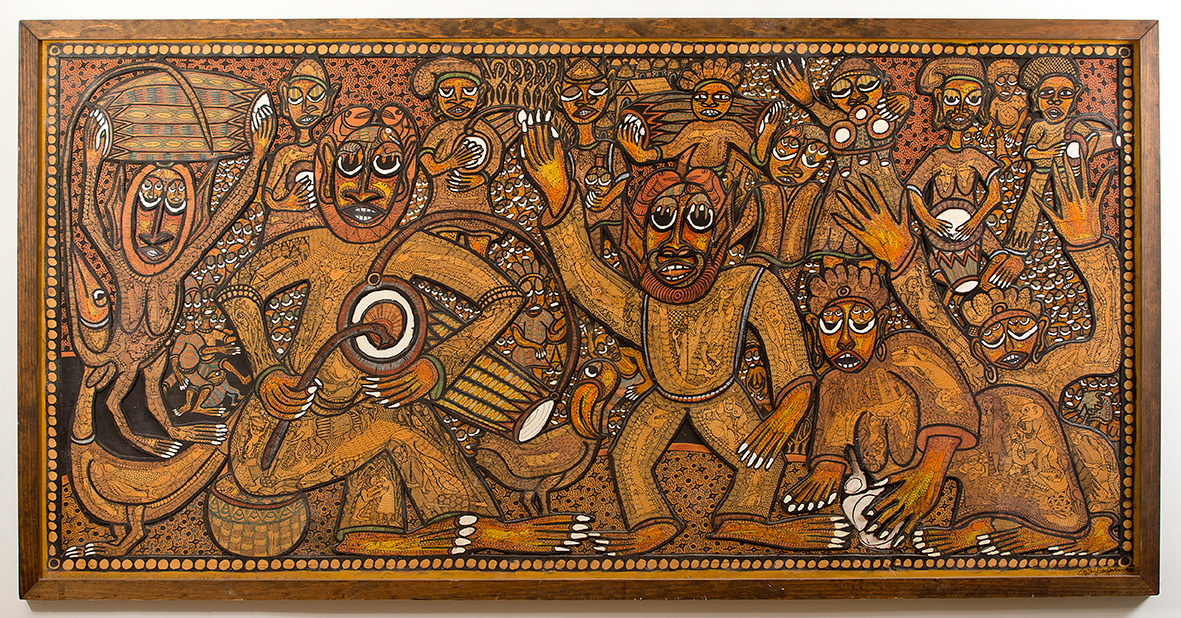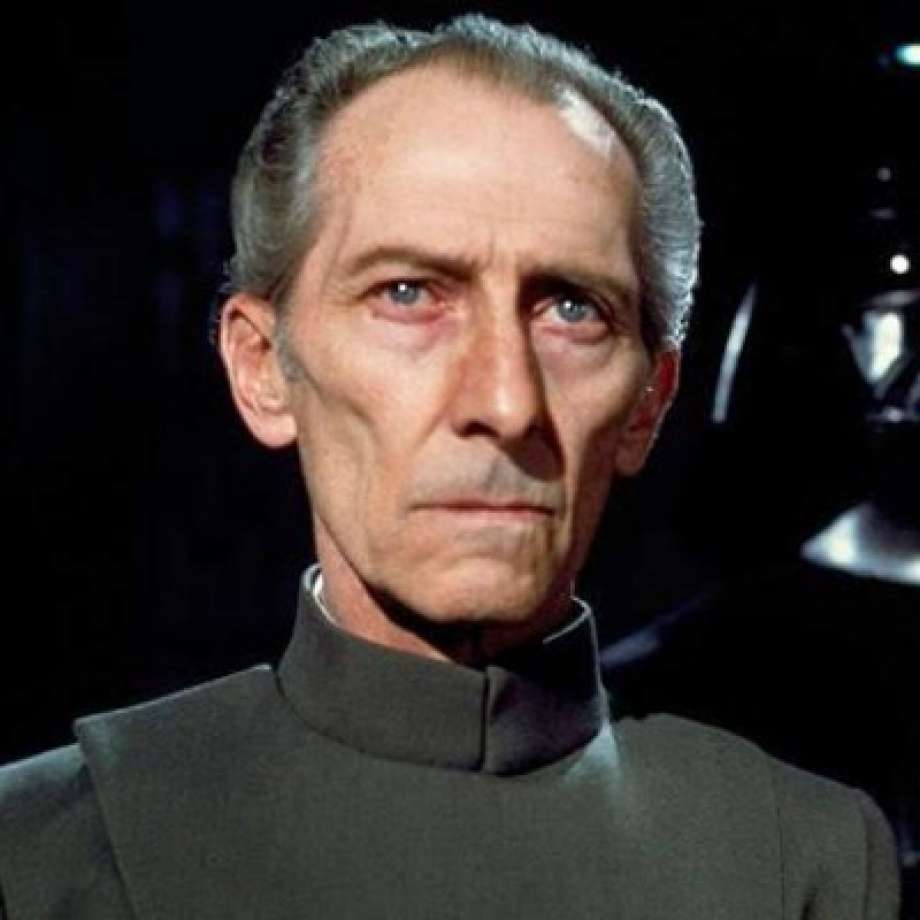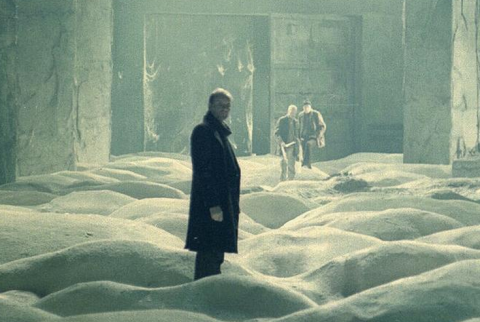Category: Film
Why is there dynamic surge pricing *for rides*?
“Surge Pricing Solves the Wild Goose Chase” is the title of the new paper by Juan Camillo Castillo and E. Glen Weyl, here is the abstract:
Why is dynamic pricing more prevalent in ride-hailing apps than movies and restaurants? Arnott (1996) observed that an over-burdened taxi dispatch system may be forced to send cars on a wild goose chase to pick up distant customers when few taxis are free. These chases occupy taxis and reduce earnings, effectively removing cars from the road and exacerbating the problem. While Arnott dismissed this outcome as a Pareto-dominated equilibrium, we show that when prices are too low relative to demand it is the unique equilibrium of a system that uses a first-dispatch protocol (as many ride-hailing services have committed to). This effect dominates more traditional price theoretic considerations and implies that welfare and profits fall dramatically as price falls below a certain threshold and then decline only gradually move in price above this point. A platform forced to charge uniform prices over time will therefore have to set very high prices to avoid catastrophic chases. Dynamic “surge pricing” can avoid these high prices while maintaining system functioning when demand is high. We show that pooling can complicate and exacerbate these problems.
Perhaps it is an analogy to suggest movie theaters might use more surge pricing if a low valuation buyer took up the seat for several showings of the movie rather than just one.
Dan Klein reviews *Rogue One* (with spoilers)
He emails to me:
I thought it great. It brings something strikingly new to the Star Wars universe – new in a number of ways, good ways:
1. It’s a self-contained heroic tragedy. You know the new characters are doomed. A useful comparison is the Obi Wan-Anakin battle in III: The Rogue One feeling of tragedy is less powerful but more comprehensive.
2. The plot and the character development are based on dissension, conflict on the rebellion side. Even the “extremist” plays a vital role in the success.
3. The dedication of rebels to the rebellion is depicted as the best of bad options for making one’s life meaningful, and as something that one gets locked-in to.
4. Rebel activity appears brutal, as though the conventional IV-VI image of the rebellion is but the fanciful illusion of those caught in the day-to-day misery of prosecuting the rebellion. But still that illusion is sustained – in Rogue One we have the drama behind a piece of that larger story, a tragic, engrossing aside.
5. On the rebel side, the Force persuasion appears, not the sage wisdom of Alec Guinness, but more the religion of deplorables, a resort of desperation. Some of the rebels come across as fanatics.
Darth is sparse but still the heavy, more chilling than ever.
BTW, the “Pappa, pappa” scene was, I think, a tribute to the 1995 Cuarón masterpiece A Little Princess.
My favorite things Nigeria
Yup, I’m here. I made this list before setting off:
1. Popular music: Few from any country come close to Fela Kuti, the main question is how many you should buy, not which ones. Most of them! On the CD medium, that old series of “two albums on one CD” was the best way to consume Fela. On streaming, you can probably just let it rip. And rip. And rip. Other favorites are King Sunny Ade and I.K. Dairo, I don’t love Fema Kuti. You also might try Nigerian psychedelic funk rock from the late 60s and early 70s, for instance found here. Most of all, there are thousands of wonderful local performers in Nigeria, you can watch a few of them on the Netflix documentary on the Nigerian music scene, titled Konkombe, recommended and only an hour long.
There is now a good deal of hit Nigerian and Nigerian-American music, such as Wizkid. It is enjoyable but does not compare to Fela in terms of staying power.
2. Basketball player: The Dream is one of my three or four favorite players of all time. My favorite Hakeem was watching him pick apart David Robinson play after play after play…see the final clip on the immediately preceding link.
3. Novel: Chinua Achebe, Things Fall Apart. Honorable mentions go to Wole Soyinka, Ben Okri, and my colleague Helon Habila. There are also the Nigerian-American writers, such as Chimamanda Ngozi Adichie. Teju Cole is worth reading, including his non-fiction.
4. Movie: Well, I’ve seen parts of some of them, and you should at least sample some Nollywood if you haven’t already. It’s kinetic. The documentary “Nollywood Babylon” (Netflix) gives you some background. As for “Movie, set in,” I draw a blank. “Album, set in and recorded in” would be Band on the Run, Paul McCartney and Wings.
5. Actor: Chiwetal Ejiofor, he starred in “Twelve Years a Slave,” and is from a Nigerian family in Britain.
6. Presidential name: Goodluck Jonathan.
7. Artist: Prince Twins Seven Seven, or more formally Prince Taiwo Olaniyi Wyewale-Toyeje Oyekale Osuntoki. He received his nickname because he was the only surviving child from seven distinct sets of twins.
8. Food dish: At least for now I have to say jollof rice, a precursor dish to jambalaya, further reports to come however!
The bottom line: Lots of talent here, plenty more on the way.
Law and Literature, syllabus for Spring 2017
The New English Bible, Oxford Study Edition
Guantanamo Diary, by Mohamedou Ould Slahi
Petinal Gappah, The Book of Memory
Glaspell’s Trifles, available on-line.
Year’s Best SF 9, edited by David G. Hartwell and Kathryn Cramer, used or Kindle edition is recommended
The Metamorphosis, In the Penal Colony, and Other Stories, by Franz Kafka, edited and translated by Joachim Neugroschel.
In the Belly of the Beast, by Jack Henry Abbott.
Primo Levi, If This is a Man
Sherlock Holmes, The Complete Novels and Stories, Sir Arthur Conan Doyle, volume 1, also on-line.
I, Robot, by Isaac Asimov.
Death and the Maiden, Ariel Dorfman.
Juan Gabriel Vasquez, Reputations
Graeme Macrae Burnet, His Bloody Project
The Pledge, Friedrich Durrenmatt.
Ian McEwan, The Children Act
Movies: Difret, Court, The Chinese Mayor, A Separation
Peter Cushing, *Rogue One*, and “fake news” will soon get worse
I was watching the excellent Rogue One when suddenly I thought “Wow, they sure found an actor who looks just like Peter Cushing.” As the scene, progressed my thoughts changed to “Tyler, are you sure that Peter Cushing passed away?” As I watching the credits, I saw a thanks to the “Estate of Peter Cushing, OBE,” and so I went back to wondering about the actor, but then why did they thank the estate?
…the face of Peter Cushing, the imposing British actor who died in 1994, lends an especially memorable presence to “Rogue One” by helping to “reprise” his “Star Wars” character, Grand Moff Tarkin, the Imperial governor who practically rules by force of glare, intonation and cheekbone.
…Under director Gareth Edwards, “Rogue One” represents another marker in the decades-long quest for the best CGI-fashioned human replicas. The filmmakers auditioned actors to “play” Cushing’s Tarkin, settling on BBC soap actor Guy Henry. This Tarkin is thus free of the dreaded “dead eye” effect. Lo, though the effects wizards walk through the “uncanny valley,” Tarkin registers as quite alive — even if his facial proportions sometimes read as ever so slightly off from the Original Trilogy. We are nearing the reality of a fully fleshed-out, CGI-enhanced performance long after an actor has passed.
If “Rogue One” wins an Oscar for effects, Cushing should be in no small part why.
When will the slope start where amateur video becomes significantly less trustworthy as well? Or even just “But Mom, I saw him do it on TV!” While we’re at it, how about a symphony orchestra conducted by “Beethoven”?
What if they made a great Star Wars movie and nobody noticed or cared?
That is how I felt watching Rogue One, which the audience seemed largely indifferent to. But contrary to what many of the reviews suggest, the plot is not especially muddled, the drama is legitimate, and the ending more than satisfactory. The visuals are spectacular, with the digital work supplemented by on-site filming in the Hashemite Kingdom of Jordan, Iceland, and the Maldives. If you have a good memory for visual images, you will notice many parallels, including homages to Kurosawa and a number of classic war movies. From the Star Wars franchise itself, episodes 1-3 are treated as iconic as are 4-6. It’s much more of a Star Wars movie than the marketing has been letting on, and indeed this is the real Star Wars movie that many of you have been waiting for. (Maybe the worse the “sequence” movies get, the better the “knock-offs” become, a’la Frank Ramsey, a nice trick they are playing here.) It’s not perfect, but had they made this instead of Return of the Jedi, at the time I would have been “happy enough.”
Will Sylvester Stallone chair the National Endowment for the Arts?
Donald Trump has drawn ‘first blood’ in the search for his incoming administration’s senior arts role – by tapping up Rambo legend Sylvester Stallone.
Sources have told DailyMail.com the president-elect sees Hollywood icon Stallone as the perfect choice to make art great again.
The likely position would be Chairman of the National Endowment for the Arts, a federal agency that doles out funds to aspiring artists and creative projects.
Here are my earlier suggestions for how Trump could improve government support for the arts. Here is an article on Stallone as painter, with photos. Furthermore, Raphael once painted Stallone. His favorite perfume is Bijan for Men by Bijan. I say this is probably a good pick, as it would bring glamor and attention to a much-neglected agency.
Addendum: Judge Dredd is an excellent movie!
Best movies of 2016
45 Years, British drama about a creaky marriage.
The Boy & the World. A Brazilian animated movie, it actually fits the cliche “unlike any movie you’ve seen before.” Preview here, other links here, good for niños but not only. Excellent soundtrack by Nana Vasconcelos.
The Second Mother. A Brazilian comedy of manners about social and economic inequality, as reflected in the relations between a maid, her visiting daughter, and the maid’s employer family. Now, to my and maybe your ears that sounds like poison, because “X is about inequality” correlates strongly with “X is not very good,” I am sorry to say. This movie is the exception, subtle throughout, and you can watch and enjoy it from any political point of view. It helps to know a bit about Brazil, and it takes about twenty minutes for the core plot to get off the ground. Links here.
Cemetery of Splendor, Thai movie by Apichatpong Weerasethakul, here is a good review.
City of Gold, a documentary with Jonathan Gold doing the ethnic food thing in Los Angeles.
Hunt for the Wilderpeople is an original movie, mostly about race, full of cinematic allusions (LOTR, First Blood, Smash Palace, classic Westerns, Butch Cassidy, Thelma and Louise, so many more) and Kiwi finery as well. None of the reviews I read seem to get it and I don’t want to send you to any of them.
The Innocents, how did those Polish nuns get pregnant?
Maggie’s Plan, a fun comedy, not at the top of this list but intelligent comedies are a dwindling species.
Ixcanul, a Mayan movie from Guatemala, might this story of an unwanted pregnancy be this year’s best movie? Here is one useful review.
Sausage Party, beyond politically incorrect, I kept on thinking I would get sick of the stupid animation and yet I never did. I remain surprised they let this one play in mainstream theaters.
Sully. He should have turned the plane around immediately under any plausible calculus, and he didn’t, so you have to give this movie the Straussian reading.
Weiner is a splendid movie with many subtle points, including in the philosophical direction. In another life, Huma Abedin could have been a movie star. She has exactly the right mix of distance and involvement, and she dominates every scene she is in, even when just sitting quietly in the background. Um…I guess she is a movie star. Starlet. Whatever.
Difret, an Ethiopian legal drama.
Andrei Tarkovsky, Ivan’s Childhood (reissue). This is one of Tarkovsky’s worst movies, and yet one of the best movies in virtually any year.
The Handmaiden, by Park Chan-wook. Imperfectly eroticized violence, but beautiful nonetheless.
Elle, by Paul Verhoeven.
Nocturnal Animals, by Tom Ford.
The bottom line
My top picks are Ixcanul, American Honey, Hunt for the Wilderpeople, Cemetery of Splendor, and Sky Ladder, with Arrival being the best mainstream Hollywood movie.
*Arrival*
I’ve never seen a movie before where I wanted to yell at the screen “It’s called the Coase theorem!”, and furthermore with complete justification. There is plenty of social science in this film, including insights from Thomas Schelling and the construction and solution of some non-cooperative games, mostly by introducing a more dynamic method of equilibrium selection. There are homages to Childhood’s End, 2001, Close Encounters, Interstellar, Buddhism, Himalayan Nagas, Eastern Orthodox, the theology of the number 12, and more. It’s hard to explain without spoiling the plot, but definitely recommended and maybe the best Hollywood movie so far this year. Nice sonics too.
How to choose and assess the movies you are watching
Greg Adamo, a loyal MR reader, writes me with a query:
I have two related questions sparked by your review of American Honey.
First, do you have any tips on judging movies? I make a lot of mistakes. I dismiss a number of very good movies after seeing them the first time. If I happen to watch them a second time – or even a third – I come to see a lot of virtues that I missed originally. I thought Pulp Fiction and the Big Lebowski were quite overrated the first time I saw them. 20 years later, having seen them both several times, my view has changed greatly. These are only two examples – there are dozens more. How can I avoid this problem?
Second, what is the correct time period for appreciating a movie? We have an annual award system (the Oscars). Like me, it also makes a lot of mistakes. Misfires like Crash or Shakespeare in Love – the don’t hold up to other winners. How Green Was My Valley beat Citizen Kane. Hitchcock never won an Oscar. It’s not just me that goofs up – it’s everyone.
I can’t help but think time is a factor. Suppose the Oscars were like the Baseball hall-of-fame and had a five-year waiting period. Would that improve the selection? Is there a market-failure in the movie-critic journalism business that pushes reviews out so near to the release date?
This is an area in which overconfidence and bias abound. I wonder if I’m better off disregarding individual movie reviews in favor of aggregated data – i.e. rotten tomatoes.
Those are some very good questions, I will offer some general observations in response:
1. If the movie was shot for the big screen, you must see it on the big screen. Otherwise your response is not to be trusted.
2. Try not to discriminate by genre or topic, for instance “I don’t like war movies,” “I don’t like romantic comedies,” and so on. You’ll miss out on the very best of that genre or topic this way, and those are very likely very good indeed. (NB: In your spare time, you can debate whether there is a horror movies exception to the principle.)
3. In my view, the bad Oscar picks were evident right away. A five year wait will only elevate some other set of mediocre movies instead. Movie awards are designed to generate publicity for the industry, not to reward merit. Ignore them.
4. I use movie criticism in the following way: I read just enough to decide if I want to see the movie, and then no more. I also try to forget what I have read. But before a second viewing of a film, I try to read as much as possible about it.
5. On net, I find the best reviews are in Variety magazine, as they are written for movie professionals. And the market for reviews is largely efficient. That is, if you read six smart critics on a movie — usually just two or three in fact — you will have a good idea of the quality of the movie. But you must put aside movies that are politically correct or culturally iconic, as they tend to be overrated. Brokeback Mountain and The Graduate will make plenty of “best of” lists, and they are both interesting and extremely important for both cinematic and cultural reasons. Still, I would not say either is a great movie, though they have some wonderful scenes and themes.
6. Hardly anyone watches enough foreign movies, that means you too. Or you might not watch enough outside your favored cinematic area, such as French, Bollywood, etc. There is a switching cost due to different cinematic “languages,” but most of your additional rewards at the margin probably lie in this direction. Furthermore, the very best foreign movies are so excellent it is easy to find out which they are.
7. I still think Pulp Fiction and The Big Lebowski, while good, are overrated. Don’t always assume your second reaction is the correct one. In addition, a lot of movies are made to be seen only once, so don’t hold that against them. For instance, I am not sure I need to see the opening sequence of Private Ryan again, but I am very glad I saw it once. It made seeing the whole movie worthwhile, but since most of the rest is ordinary, albeit serviceable, seeing it again would be excruciating.
8. It is a mistake to smugly assume that television has surpassed movies. The best movies (mostly foreign) are better than the best TV, even today.
What tips can you all offer?
*Walk Through Walls*
That’s the new and very direct and frank memoir by Marina Abramović. It is a narrative of how a very smart and insightful person can choose (almost) never to think like an economist, and how she might evolve from a naive Serbian virgin to one of the world’s most worldly, serene, and profound performers. Here is one part:
My parents’ marriage was like a war — I never saw them hug or kiss or express any affection toward each other. Maybe it was just an old habit from partisan days, but they both slept with loaded pistols on their bedside tables! I remember once, during a rare period when they were speaking to each other, my father came home for lunch and my mother said, “Do you want soup?” And when he said yes, she came up behind him and dumped the hot soup on his head. He screamed, pushed the table away, broke every dish in the room, and walked out.
As for her famed lover, the unreliable Ulay, the cause of her broken heart:
A small crowd was there to watch our meeting [on China’s Great Wall]. I wept as he embraced me. It was the embrace of a comrade, not a lover: the warmth had drained out of him. I would soon learn that he had impregnated his translator: Ding Xiao Song. They would marry in Beijing in December.
This book passed the core test that I wanted it to be much longer than it was. Here is a good Carl Swanson profile of the artist and the book, maybe the best piece I have read this week.
Vertical Integration, Market Foreclosure, and Consumer Welfare in the Cable Television Industry
That is the title of a 2001 AER piece by Tasneem Chipty, here is the abstract:
I examine the effects of vertical integration between programming and distribution in the cable television industry. I assess the effects of ownership structure on program offerings, prices, and subscriptions, and I compare consumer welfare across integrated and unintegrated markets. The results of this analysis suggest two general conclusions. First, integrated operators tend to exclude rival program services, suggesting that certain program services cannot gain access to the distribution networks of vertically integrated cable system operators. Second, vertical integration does not harm, and may actually benefit, consumers because of the associated efficiency gains.
Out of date, yes, but still evidence that the proposed AT&T and Time-Warner merger is unlikely to damage the interests of consumers. When there is some market power at each step along the supply chain, vertical integration typically lowers margins and prices, thereby increasing consumer surplus.
For the pointer I thank John Chilton, who also points us to this review chapter by Paul Joskow. Here is a good James B. Stewart (NYT) piece on how antitrust thinking is moving backward these days, away from science more toward mood affiliation.
The proposed AT&T and Time-Warner merger
The deal may “feel wrong” to a lot of people, but for the regulators it ought not to be a big deal:
AT&T’s proposed acquisition of Time Warner…is considered “vertical” because the two companies largely do not compete against each other but operate on the same supply chain.
This is the bottom line:
“By standard antitrust metrics, this deal should be O.K. in Washington,” said Paul Gallant, a technology, media and telecommunications policy analyst with Cowen & Company. “But the Democratic Party is moving left, and if Clinton wins, this could become an early test for her ‘tougher on business’ rhetoric.”
The negative arguments are speculative or quite a stretch:
AT&T could make it more expensive for its competitors to gain access to Time Warner’s content or give preferential treatment to its own programming, said John Bergmayer, senior counsel at Public Knowledge, a digital rights advocacy group.
That is all from Leslie Picker and Cecilia Kang at the NYT. I would stress that “entertainment” and “content” are sectors where choices have exploded more or less without precedent. If the goal is to stop Time-Warner content from spreading to multiple sectors of the consumer media universe, I don’t see this one as a winner.
More generally, it is hard to see where the efficiencies from the deal are supposed to come from. About the recent Bayer and Monsanto proposed merger I wrote:
There is a well-known academic literature, dating to the early 1990s, showing that acquiring firms usually decline in value after tender offers, especially after the biggest deals. Mergers do not seem to make companies more valuable or efficient.
Why then do so many mergers and acquisitions happen? Well, some of them do pay off (Google buying YouTube), but also many managers engage in empire-building by increasing the size of their companies, even at the expense of the shareholders. Another possibility is what economists call “winner’s curse,” namely that the winner of an auction or contest or bidding war tends to be the person or institution most optimistic, and in fact overly optimistic, about the value at stake.
So from a social point of view, I doubt if there is so much at stake here.
Addendum: Matt Yglesias comments. And here is FT coverage.
Predicting Your Major Based on Your Favorite Harry Potter Character
The accuracy of these tests is astounding.
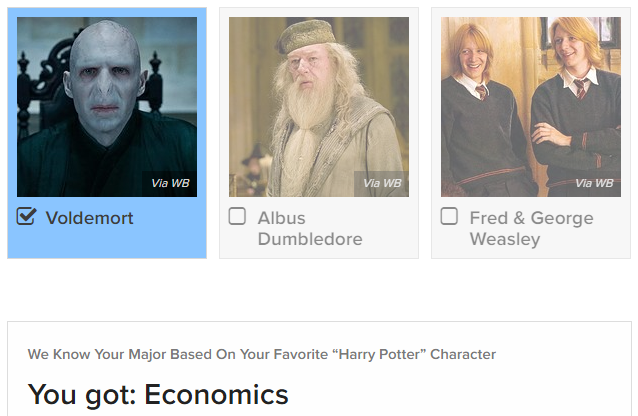
Hat tip: Nathaniel B.
What I’ve Been Watching: Knox, Cage, Westworld
Amanda Knox on Netflix is a shorter version of Making a Murderer. Shorter because there isn’t much evidence that Knox had anything to do with the murder of her  housemate. The documentary has extensive interviews with the lead investigator, a blowhard who likens himself to Sherlock Holmes but whose idea of deduction is that the murderer must have been a woman because the body was covered up. Surprisingly, the one clear sociopath isn’t the actual killer but the journalist whose lurid dispatches turned a tragic but ordinary murder into a witch hunt–a real Nightcrawler. Throw in some nationalism on both the Italian and U.S. sides and it’s not surprising that justice went awry. Trump has a cameo.
housemate. The documentary has extensive interviews with the lead investigator, a blowhard who likens himself to Sherlock Holmes but whose idea of deduction is that the murderer must have been a woman because the body was covered up. Surprisingly, the one clear sociopath isn’t the actual killer but the journalist whose lurid dispatches turned a tragic but ordinary murder into a witch hunt–a real Nightcrawler. Throw in some nationalism on both the Italian and U.S. sides and it’s not surprising that justice went awry. Trump has a cameo.
Luke Cage, also on Netflix, is the latest Marvel superhero story set in the same New York universe as Daredevil and Jessica Jones. Harlem is lovingly portrayed and the barbershop name dropping–Walter Mosley, Zora Neal Hurston, Crispus Attucks–and 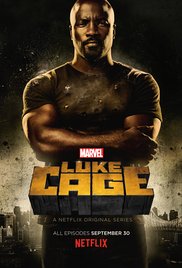 various basketball, jazz, and rap references adds color. The central conflict, however, is flat. Super-strong, well-nigh invulnerable Cage is not evenly-matched by drug dealer-businessman Cottonmouth. Despite a watchable performance by Mahershala Ali, Cottonmouth is no Kingpin. Vincent D’Onofrio’s Kingpin had Shakespearean intensity, depth, and the physical power to battle a super-hero. Indeed, one of the things that made Daredevil special was that you could see his exhaustion and pain in every battle. Similarly, Jessica Jones’s nemesis, Kilgrave, was one of the most horrific characters ever seen on television (in a great understated performance by David Tennant) and Kilgrave had Jones under his thumb for much of the season. Super heroes need super villains. To be sure, there is pickup in the second half of Luke Cage, but it takes a long time to develop.
various basketball, jazz, and rap references adds color. The central conflict, however, is flat. Super-strong, well-nigh invulnerable Cage is not evenly-matched by drug dealer-businessman Cottonmouth. Despite a watchable performance by Mahershala Ali, Cottonmouth is no Kingpin. Vincent D’Onofrio’s Kingpin had Shakespearean intensity, depth, and the physical power to battle a super-hero. Indeed, one of the things that made Daredevil special was that you could see his exhaustion and pain in every battle. Similarly, Jessica Jones’s nemesis, Kilgrave, was one of the most horrific characters ever seen on television (in a great understated performance by David Tennant) and Kilgrave had Jones under his thumb for much of the season. Super heroes need super villains. To be sure, there is pickup in the second half of Luke Cage, but it takes a long time to develop.
Westworld (HBO)–this is the one that you must watch. The first two episodes have been remarkable. Every scene has something to see or to think about. Audience expectations are continually subverted. The cinematography is stunning.
One characters says “That’s what I love about this place all the secrets, all the little things I never noticed even after all these years. You know why this place beats the real world…in here every det ail adds up to something.” Very meta. The shots also speak to the structure of the plot. Look at this amazing shot of the control building–levels of meaning.
ail adds up to something.” Very meta. The shots also speak to the structure of the plot. Look at this amazing shot of the control building–levels of meaning.
It does not pass notice that it’s bright and shiny on top but the lower levels–the subconscious–are dark, moist, subterranean. We are told that WestWorld is a maze, a maze literally and figuratively, in our heads.
Westworld also challenges us with questions. Who are we? If we visited Westworld would we be the good guys or the bad guys? How many of us secretly harbor the desire to do evil and are restrained only by fear of punishment? What kind of Zimbardo experiment is Westworld?
Or are we the operators of Westworld who treat other people (?) as mere means and not as ends in themselves? Parts of Westworld look like an abattoir and from one perspective there are mass rapes.
Or are we the robots, living in a simulation, a reality of someone else’s construction? And what is going on with the corporation? The ultimate god?
The executive producer of Westworld is Jonathan Nolan, brother of Christopher, and writer or co-writer of Memento, The Prestige, The Dark Night and Interstellar.
We are only two episodes in but so far this is thrilling art in action.
